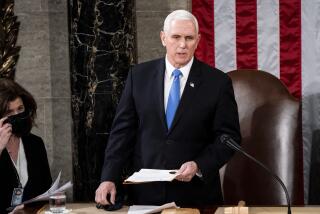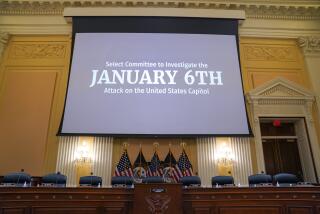Israel Balks at Walsh Probe, Assails Kimche Subpoena
- Share via
WASHINGTON — A federal judge on Friday delayed a scheduled grand jury appearance by David Kimche, a key Israeli figure in the Iran- contra scandal, and the Israeli government later warned that it will refuse to cooperate with independent counsel Lawrence E. Walsh until he drops efforts to compel testimony from its citizens.
The court-ordered delay appeared to dash prospects that Kimche will ever be required to testify before Walsh’s grand jury, which is investigating possibly criminal aspects of the Reagan Administration’s arms-for-hostages swap with Iran and its secret aid to the Nicaraguan rebels.
Agents for Walsh subpoenaed Kimche when the former deputy director of Israel’s foreign ministry was in New York on Wednesday. But Israeli officials, protesting that the subpoena violated an agreement between the U.S. and Israeli governments, ordered Kimche not to talk to the grand jury about anything he did while working for the Israeli government.
U.S. District Judge Aubrey Robinson Jr. excused Kimche from a scheduled appearance before Walsh’s panel Friday while he considered Israeli arguments against the subpoena. Kimche indicated he would return to Israel, where a U.S. subpoena would have no legal power, and said his possible return to the United States to testify was “under consideration.”
The State Department, in carefully worded comments, said Kimche “may be immune” under international law from being forced to testify even though U.S. law gives him no protection from a grand jury subpoena. It said the Israeli government unsuccessfully sought diplomatic status for Kimche before his U.S. trip, which would have made him immune from Walsh’s subpoena.
In Washington, Israeli Embassy spokesman Yossi Gal said the State Department has been told that “as long as the subpoena is in place, we will not cooperate with the independent counsel.”
Israeli Cabinet Secretary Elyakim Rubinstein, who heads a liaison committee with the United States on the Iran-contra affair, said in a Jerusalem radio interview that Israel will cooperate only through “diplomatic channels . . . (and) not by coercion in court.”
He added: “I can only say to the prosecutor--to Walsh--that you try for too much and you’ll get nothing.” He refused to elaborate.
Kimche is a vital witness in Walsh’s probe. As deputy director of Israel’s foreign ministry, he was a go-between for Iran and the United States when secret arms sales to Iran were negotiated in mid-1985. He also is among several people said to have developed the proposal to channel profits from the Iran arms sales to the contras.
The scrap over his testimony highlights the friction between the Israelis and Walsh’s investigators, who so far have been denied direct access to Israeli participants in the affair. As early as March, U.S. officials close to Walsh’s probe accused Israel of “stonewalling” the independent counsel’s investigation.
Israel maintains it has an agreement with the United States allowing investigators to direct written queries to Israeli figures in the Iran-contra affair via the State Department, but not to interview them directly. Israel also agreed to provide two written reports on the extent of its role in arranging the covert supply of U.S. arms to Iran.
Israel has delivered the first report, a chronology of financial transactions in the Iran arms affair. But it has yet to furnish a second report on the roles played by Kimche and other Israeli officials in the scandal.
Senior Israeli officials vigorously objected to the subpoena Friday. Prime Minister Yitzhak Shamir denounced Walsh’s action as a “clear violation” of the U.S.-Israeli agreement and said Kimche “would not be permitted (by Israel) to be interrogated” by the U.S. grand jury.
Speaking to reporters in Kiryat Anavim, a town near Jerusalem where he delivered a speech earlier in the day, Shamir accused Walsh of exploiting Kimche’s visit to the United States to issue the subpoena.
“The very act of investigating (Kimche) is illegal,” Shamir said. “He acted not as an individual but in the name of the Israeli government.”
The State Department did not agree Friday that Kimche is immune from a subpoena. It noted that he was not an accredited diplomat at the time of the Iran arms talks and enjoyed no diplomatic protection from the law.
But spokesman Charles Redman, apparently distancing himself from Walsh’s subpoena, said Kimche may still be immune from testifying before a U.S. jury about his actions as an Israeli government official.
Should a similar affair occur in Israel, Redman said, Washington “would be very concerned about foreign efforts to make past officials of the U.S. government disclose sensitive matters.”
In a separate matter, attorneys for former White House aide Oliver L. North made another effort Friday to quash Walsh’s investigation, arguing in an appeals court brief that the 1978 law authorizing independent counsel inquiries violates the Constitution.
The 77-page brief contends that the 1978 Ethics in Government Act is unconstitutional because it allows a special federal court to convene investigations by independent counsels. The Constitution reserves the right of prosecution to the executive branch, not the judiciary, the attorneys argued.
The lawyers apparently filed the brief as part of a month-long battle against two sealed subpoenas issued to North by Walsh’s grand jury. North’s lawyers first filed objections to the subpoenas in the U.S. Court of Appeals for the District of Columbia earlier this month, after a district judge apparently rejected bids to block them.
The appeals court has scheduled an oral argument on one of those cases for June 2.
North’s lawyers filed similar objections to the ethics law last March, but a judge threw them out, saying the arguments were premature until North or another figure in the Iran-contra affair was charged with a criminal violation.
Michael Wines reported from Washington and Michael Ross from Jerusalem.
More to Read
Get the L.A. Times Politics newsletter
Deeply reported insights into legislation, politics and policy from Sacramento, Washington and beyond. In your inbox twice per week.
You may occasionally receive promotional content from the Los Angeles Times.









